AMABHUNGANE
#MotiFiles: Inside VBS’s R1.3bn gold-fuelled ‘hawala’
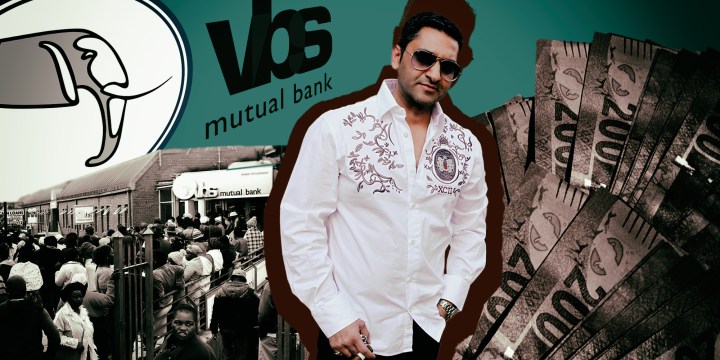
Bank records and documents from the #MotiFiles show how suspicious accounts at the gutted VBS Mutual Bank were used on a massive scale by Zimbabweans to illicitly shift money and transact in South Africa. The clientele ranged from shoe importers to alleged money launderers – and included Zunaid Moti.
Update: Apology to Mr Moti
Mr Zunaid Moti lodged a complaint against amaBhungane with the South African Press Ombud.
The complaint alleged that the article breached the South African Press Code on three grounds, namely misrepresentation of facts; the use of a manipulated image; and the lack of a right of reply.
The Press Ombud, Herman Scholtz, rejected the complaint on the first two grounds, but found that Mr Moti had not been afforded an effective right of reply prior to publication.
AmaBhungane apologises for this.
In response to the invitation by the Ombud to respond in more detail to the article, the Moti Group stated that “neither Zunaid Moti, nor the Moti Group, have ever had any dealings with VBS or its management”, and added that he was “not comfortable commenting on the article in detail since there are open investigations against Clinton van Niekerk and his cohorts”.
This article has been updated to reflect his comment.
The full ruling by the Press Ombud can be read here. DM
Between late 2016 and up to the collapse of VBS Mutual Bank in March 2018, a colossal “hawala” scheme seemingly operated through three VBS accounts, receiving and rapidly paying out roughly R1.3-billion to a wide array of South African companies and individuals.
A hawala is a money-transfer system which involves paying an operator in one country who then instructs a counterpart in another country to release an equivalent amount to the intended beneficiary without any formal cross-border payments taking place.
The object is to circumvent banks and financial authorities.
Evidence suggests that this VBS scheme, seemingly powered by the profits of the illicit gold trade, was rapidly gaining steam when the collapse of the bank cut it short.
The VBS hawala system seemingly served two purposes:
On the one hand, it helped Zimbabweans, including it appears some legitimate businesses, to completely circumvent the country’s extreme exchange controls.
On the other, the scheme seemingly served as a mechanism for money laundering and illicit financial flows via the shadowy local gold industry.
Among the recipients shortly before the bank collapse were companies in the Moti Group who received millions, apparently as part of a convoluted money-moving operation that is the subject of our latest #MotiLeaks exposé, also published today.
A spokesperson for Moti told us, “Neither Mr Zunaid Moti, nor the Moti Group, have ever had any dealings with VBS or its management.”
Other notable recipients of money out of this system include members of the Macmillan and Rudland families of Zimbabwe, both linked to alleged money laundering, as well as possibly one high-flying member of the Mugabe family, among many others.
The scheme at VBS was allegedly set up by family members of notorious alleged Zimbabwean money launderer Ewan Macmillan, outed by Al Jazeera in its “Gold Mafia” documentary series earlier this year.
Furthermore, evidence gathered by investigations into VBS’s collapse point towards bribes totalling several million rands having been paid to the bank’s bosses by whoever controlled this system.
The setup
Most of the attention paid to VBS revolved around the patronage networks developed between bank bosses and politicians. But before its collapse under the weight of management fraud in early 2018, the bank became a nexus of all kinds of alleged criminal schemes united by one thing: the utility of a bank that could be counted on to look the other way.
By way of example, amaBhungane previously reported on what appeared to be a money laundering operation whereby VBS helped expatriate millions stolen from a Namibian bank.
Investigators sifting through the wreckage of VBS, however, found three accounts whose transaction volumes dwarfed virtually everything else that was going on at the doomed institution.
These accounts belonged to closely related South African companies: Caydees Imports and Exports, Caylons Goods and Services and Taintons Goods and Service.
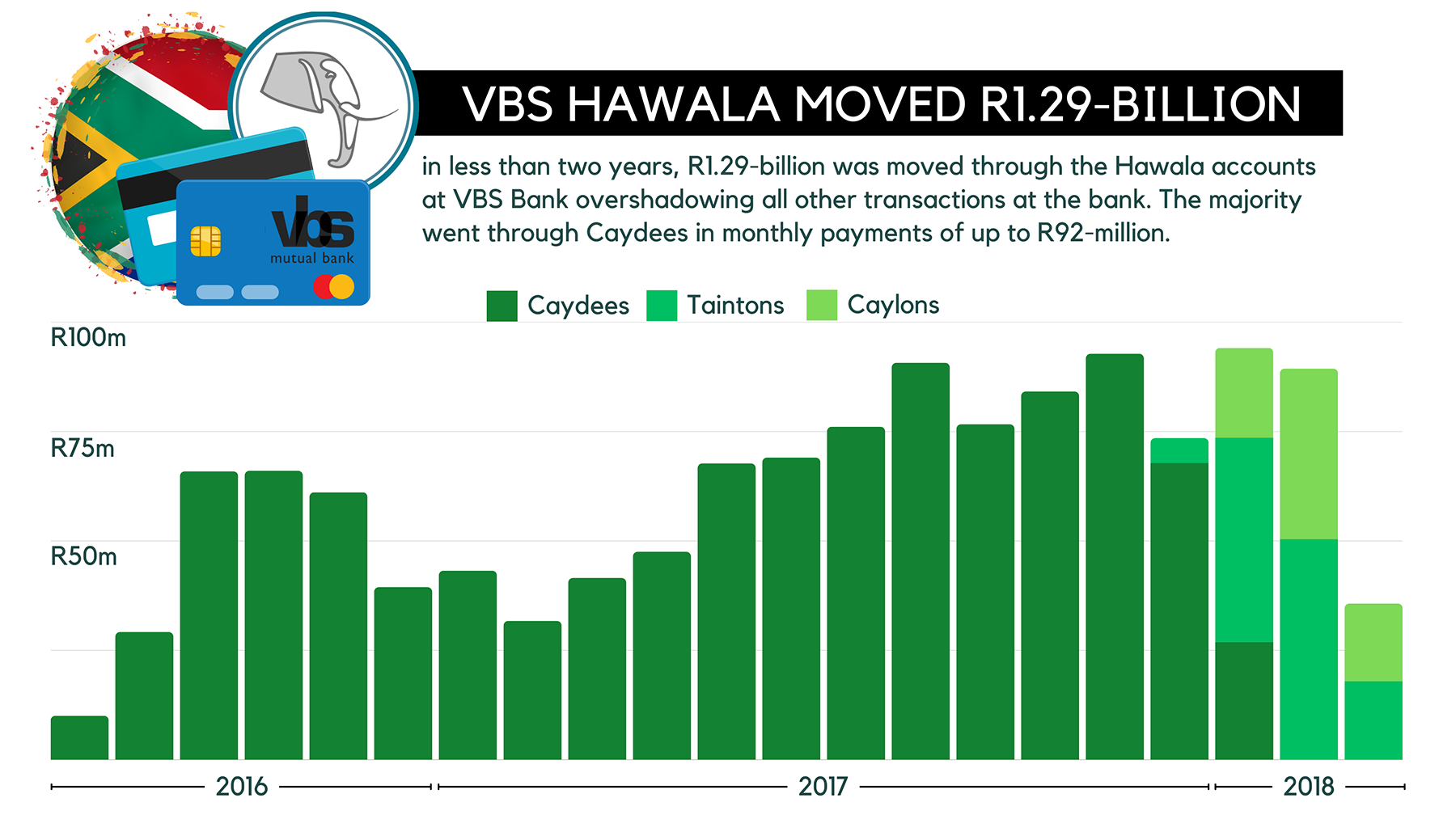
Together, these accounts sometimes paid out just shy of R100-million per month. The earliest and longest-lived by far was Caydees, which was flagged as worthy of further investigation by Werksmans Attorneys who undertook the earliest forensic analysis of VBS in 2018.
Their report, a confidential annexure to the public “Great Bank Heist” report produced by Advocate Terry Motau, showed that there was reason to believe that VBS management was bribed to pave the way for this money-moving system to be set up.
It may even have been instrumental in the original hijacking of the bank.
Caydees had separate accounts at Standard Bank and Absa which paid money into VBS accounts belonging to “persons of interest”, the investigators found.
R13.7-million was paid from Caydees’ Absa account into a VBS account used by companies tied to former VBS chair Tshifhiwa Matodzi to buy the shares that ultimately led to the bank falling under his control.
Further payments of more than R3-million were allegedly made to Matodzi-tied companies and another R920,000 to the CEO of VBS Andile Ramavhunga.
Matodzi and Ramavhunga are still facing charges over their alleged looting of VBS.
On the other side of the equation, the creators and controllers of the three accounts are harder to discern.
The director of all three companies was one Chantell Groenewald, but she is understood to have been a stand-in for other interests. She failed to respond to questions.
Some sources indicate that the accounts were set up by a family member of the notorious Ewan Macmillan who was recently caught on camera offering undercover reporters from the investigative team of Al Jazeera his services as a money launderer in their “Gold Mafia” documentary series.
Bank records reflect the Macmillan family using the VBS accounts frequently for relatively trivial payments, among others for the wedding of Sarah Rudland (tobacco baron Simon’s daughter) to Bruce Macmillan, brother to Ewan.
While the first hawala account, Caydees, was already set up in late 2016 the other two, Taintons and Caylons, only started up in late 2017, shortly before VBS collapsed.
But perhaps more interesting than how the system was created is how, and by whom, it was funded.
Gold and jewels
In order for a hawala to work you not only need an agent to collect money in country A, you need a party to make payments in country B. But since the whole point is to avoid formal cross-border payments, how does the party in country B get all the cash they need?
According to accounts obtained by amaBhungane, on the Zimbabwean side, the operators of the VBS accounts physically collected US dollars from clients who needed to make foreign payments or simply wanted to smuggle money out of Zimbabwe – illicit capital flight the country could hardly afford. At the time it was virtually impossible to transact through the formal banking system because the Zimbabwean Reserve Bank would effectively confiscate US dollars and replace them with barely usable local currency.
Following the cash collections in Zimbabwe, the hawala accounts at VBS in South Africa would get credited with millions from a source that immediately raises red flags: the second-hand gold industry.
One major contributor to the VBS hawala was JR Technical Services, which paid more than R120-million into the hawala in South Africa.
We have encountered this company before, in a tax case between SARS and a gold refinery called Rappa Resources which was implicated in the multibillion-rand gold export scheme.
The scheme involved what SARS dubbed “second tier” gold suppliers who often only existed on paper allegedly buying illicit gold and selling it to “first tier” suppliers who in turn sold it to Rappa after various degrees of refining. Along the way, they would allegedly create false paper trails to legitimise the gold.
Fake invoices would present the metal as coming from scrap purchased at for instance pawn shops (which would attract VAT). When this gold is refined into gold bars and exported the sale is VAT-free which means they qualified for massive tax refunds. However, since much of what was getting exported was really illicit gold, no VAT was ever paid and the refunds were really theft from the state.
The illicit gold included tons of smelted Krugerrands, which is illegal given that these coins are considered legal currency, but another source, according to SARS, was likely also gold procured from illegal mining – and smuggling from across the border.
This is where the link to Zimbabwe becomes doubly interesting.
JR Technical, which fed the VBS hawala, was identified as one of the major “first tier” suppliers providing gold directly to Rappa after buying it from roughly nine “second tier” suppliers.
After confirming his email address to amaBhungane, JR Technical MD Hugo van Loggerenberg elected not to respond to questions.
According to records contained in court documents, JR Technical sold roughly 1.7 tons of gold worth around R900-million to Rappa during the lifespan of the VBS hawala. This is not to suggest that all the proceeds made their way to VBS, but illustrates the scale of the cash flow.
Yet another company feeding millions to the VBS accounts was Santec Security Services, a registered cash-in-transit company operating in the orbit of the local gold industry. Its owner Pieter Engelbrecht also elected not to respond to questions.
It is worth mentioning that both JR Technical and Santec were among 64 companies in the orbit of the gold industry that have been under investigation by the Hawks’ National and Transnational Organised Crime unit as part of an illicit gold project codenamed “Gravity”.
Another major contributor to the VBS hawala is an entity identified in bank statements as “Instant Cash Jewelry”, which is not a registered company but which likewise paid millions over an exceedingly short period of time. It paid more than R360-million into the hawala.
Throughout the life of the hawala the pattern remained the same: chunks of money would arrive from funders like JR Technical and soon after get paid out again. Below is an extract showing money arriving from this funder and quickly getting paid out to one of controversial businessman Zunaid Moti’s property companies.
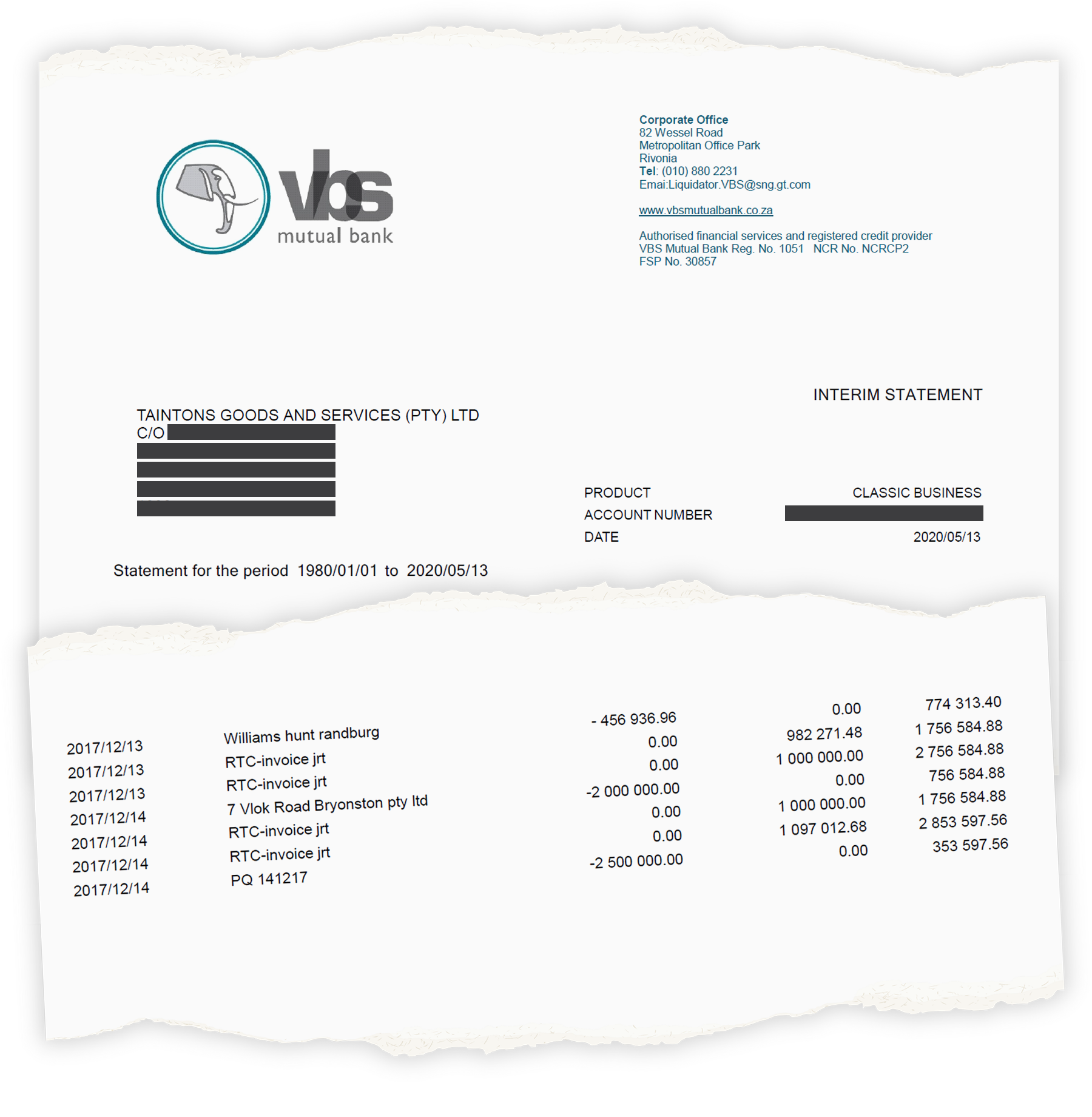
This does not mean that Moti is getting paid by JR Technical but rather that Moti, using the hawala, is getting paid by someone in Zimbabwe. The transaction is however being made possible by cash provided by JR Technical.
Missing link
If South African companies linked to the gold industry were funding the hawala, the question becomes: what’s in it for them?
A speculative answer is that the whole system was in reality a way to launder illegal gold smuggled from Zimbabwe for refining in South Africa. In this scenario, the South African gold refiner would be “paying” for the gold by funding the hawala.
How this would work is that the hawala operators could collect for instance $100 from clients in Zimbabwe and then have to pay parties in South Africa the rand equivalent via VBS. To do that they would use the dollars to buy gold to smuggle to the refineries. The refinery gets the gold and, in exchange, funds the VBS accounts the hawala operator needs to make their rand payments – likely minus a commission.
The missing link is then the movement of the physical gold from Zimbabwe to South Africa.
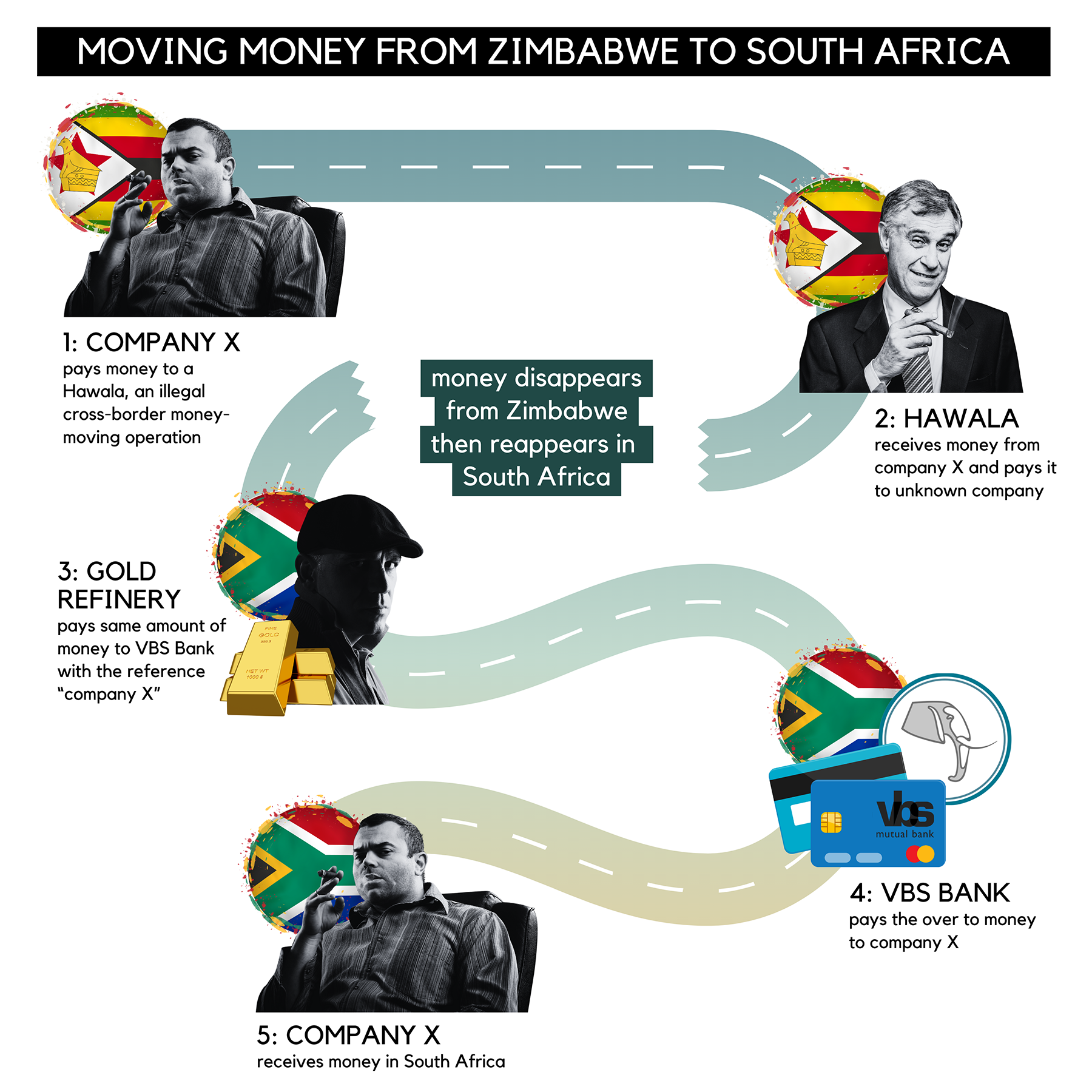
Whatever the case, it is clear that there was some form of transfer between the dollar collectors in Zimbabwe and the funders of the VBS hawala in South Africa.
The major users of the hawala seem to include normal companies buying goods and services from South African companies. This allowed them to conduct business while avoiding Zimbabwe’s exchange control restrictions and bottlenecks.
These companies ranged from importers of steel to vehicles and shoes.
Moti and Mugabe
AmaBhungane published another article today, Part One of an investigation into the Moti Group’s use of complex webs of financial flows enlisting the help of shadowy intermediaries.
The Moti Group was engaged in, at the very least, what looks like irregular cross-border capital transfer.
The VBS hawala forms one part of that story although Moti and his collaborators have denied any knowledge of the VBS system.
Nonetheless, among the thousands of payments recorded in VBS statements are a set made to a number of Moti companies in late 2017 and early 2018 totalling just under R27-million. Given that VBS imploded at this point it seems reasonable to assume the channel would otherwise have continued to be used by Moti and many others.
In the next instalment of our investigation, which will be published later this week, we will show how the VBS hawala was just one channel through which Moti seemingly illicitly moved money.
Other tantalising entries in the Caydees books include a “BC Mugabe”, reflecting the initials of Robert Mugabe’s youngest son Bellarmine Chatunga Mugabe. Thirteen payments totalling just shy of R10-million were made to this individual during the tumultuous lead-up to the ouster of the elder Mugabe from power in November 2017.
At the time there were outraged news reports of Bellarmine’s extravagant lifestyle in Johannesburg.
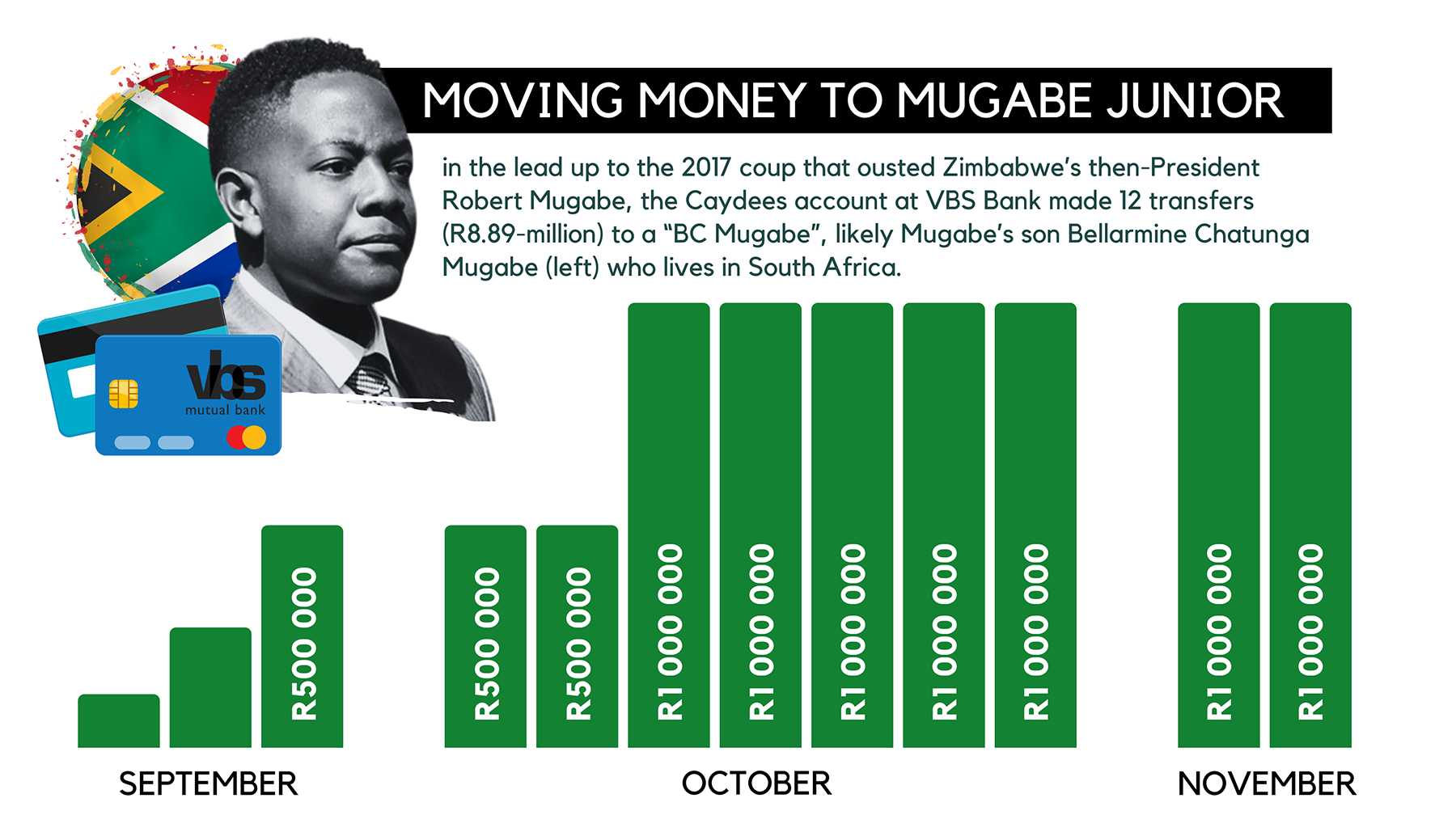
All told the VBS hawala represents one of the many ways in which Zimbabwe has been starved of the capital its devastated economy requires, seemingly with the connivance of its political elite.
Simultaneously it shows how the broken and inadequate systems that saw VBS descend into outright criminality were seized upon by any number of opportunistic parties operating in the dark corners of the South African – and regional – economy. DM















 Become an Insider
Become an Insider
I understand Hawala but I still don’t get it from this article.
1. Person in Zim wants to transfer money to SA
2. He gives it to VBS presumably in Zim Dollars
3. VBS pays out in SA
You explained that SA parties funded the payout by depositing in VBS but the gold story makes no sense. If the parties in Zim could muggle out the gold physically why did they need VBS for the transaction.
Did I miss something.
Yes you missed quite a lot.
This issue of the DM covers gangsterism on every level of South African society. The horrifying issue is that the state has a finger in all these pies – be it drug dealing on the Cape Flats or money laundering by big business or bankrupting and mismanaging of SOE’s. There is a corrupt cop and politician involved in each of these scenarios.
Gordhan is no angel. There is and has always been corruption in each of these SOE’s. He knows who does what and seems to get rid of the good guys on quite a regular basis. Who is he covering for? What is he hiding?
Cyril has no problem with the smutty high brass in Zimbabwe no matter how often their dirty work gets exposed. He must be involved with what is going down there. Why would he be so accepting of their filthy work if there is nothing in it for him? And so it goes – you name them. Not one pair of clean hands.
The police service is rotten to the core and manipulated by politicians to cover up the mess as we all know.
Not one of these are better or worse than common gangsters. They are only good at being criminals and nothing else. That is also why gangs are rife and nothing gets done about it. It is also why we have become a haven for Israeli and East Block thugs. They are all hand in glove and rotten to the core.
And the puppeteer is the South African government.